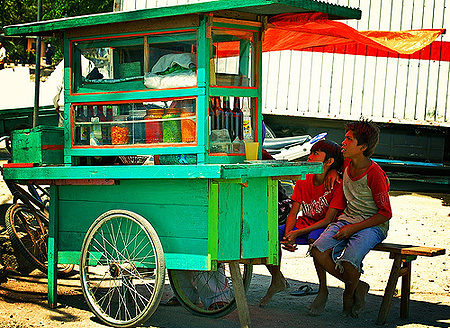
What do you do when you’re number 126 out of 180 on Transparency International’s corruption perception list? What do you do when prosecuting mid- and high-level officials for corruption doesn’t seem to be doing enough to curb the corrupt tendencies rampant in society?
Well, if you’re Indonesia, you start with the basics. In an ingenious move aimed at teaching people the value of honesty, Indonesia’s attorney general and his provincial counterparts have kick-started a national campaign that aims to open 10 000 so-called ‘honesty cafes’ all over Indonesia by the end of the year. The idea- intuitive and inventive at once- is that instead of paying a set amount to a cashier (someone who is, in effect, employed to enforce morality in a low-level commercial transaction), customers pay an ‘honest amount’ into a clear, unsupervised box.
In effect they pay what they think they should pay and pay because they know it is the right thing to do (and because others watch them pay). If I ever saw an interesting social experiment on a society-wide scale, this must be it.
The idea is that honesty and morality is best learned in everyday situations. It is not a classroom subject but something that is instilled in people through an upbringing that in one way or the other emphasizes that honest behavior is good, rewarded and ultimately to the benefit of society.
In Indonesia, where corruption is endemic and an everyday occurrence for most people, honesty, it seems, has gotten lost in the muddle that is a vast and rapidly developing country with a history of corruption at the highest levels. Honesty, for many people, is unaffordable as even the simplest official transaction requires a little ‘oil’ to get through. And honesty, until now, was hardly something Indonesian leaders liked to teach by example (ie. Suharto).
While the government has indicated that it seeks to target young people in particular (the first and most successful ones have been opened in association with schools), the ultimate aim is to open such cafes in government offices and privately as well. But, as they say, it is tough to teach an old dog new tricks and there are already signs that amongst civil servants the honesty-brew isn’t going down quite as smoothly as it should. In an excellent article on the issue in the New York Times, an Indonesian procurement official noted that “I guess honesty cafes are OK. But, you know, this is Indonesia.” Anticorruption officials are hoping to change this mentality. But it is likely to take long.
In addition to good press, participants in the scheme are reporting healthy profits and reduced levels of cheating in classes. Indonesia’s young, it seems, are eager to learn.

